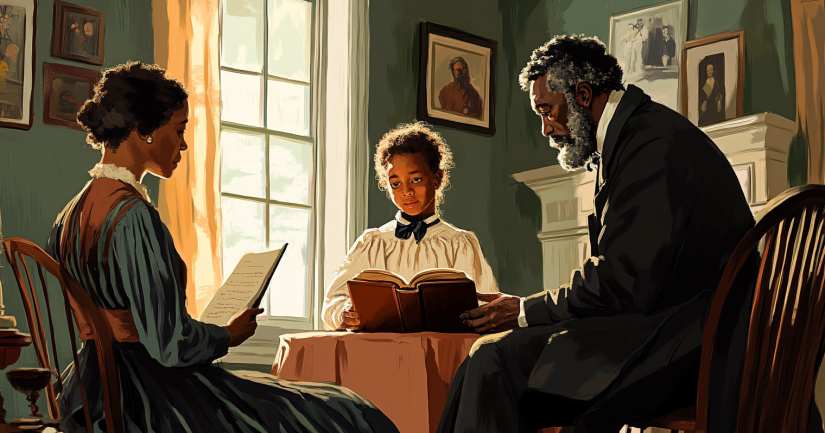
Reflect on transformative moments in Narrative Of The Life Of Frederick Douglass Chapter 6 Quiz, showcasing his pursuit of knowledge. This chapter unveils the poignant journey of Douglass as he discovers the power of literacy. In this part of his narrative, Douglass experiences both hope and despair. He learns the alphabet from Mrs. Auld, a kind yet naive woman. Her husband, however, believes literacy would make Douglass unfit for slavery.
As you delve into this quiz, you will unravel the layers of Douglass’s thirst for freedom. Each question guides you through his struggles and triumphs. You will explore the themes of education, empowerment, and resistance. The quiz challenges you to think deeply about the impact of literacy on Douglass’s life. It also invites you to reflect on the broader implications of knowledge as a tool for liberation.
With Douglass’s journey continues, so does your challenge—see what happens next by testing yourself with the Narrative Of The Life Of Frederick Douglass Chapter 7 Quiz. If you need to revisit earlier struggles, go back to the Narrative Of The Life Of Frederick Douglass Chapter 5 Quiz. Then, put your complete knowledge to the test by taking the Narrative of the Life of Frederick Douglass Full Book Quiz.
Begin Testing – Narrative Of The Life Of Frederick Douglass Chapter 06 Quiz
Engage with the text and discover how Douglass’s narrative continues to inspire. This quiz not only tests your understanding but also enriches your appreciation of this monumental work.
This conflict ignites Douglass’s determination to seek knowledge.
Test your knowledge with: Narrative of the Life of Frederick Douglass Quizzes!
What Happened – Narrative Of The Life Of Frederick Douglass Chapter 6
In Chapter 6 of Narrative of the Life of Frederick Douglass, Frederick Douglass describes his life in Baltimore. He is sent to live with Hugh and Sophia Auld. Sophia Auld is kind to him at first. She begins to teach Douglass the alphabet. Mr. Auld discovers this and tells her to stop. Douglass believes education will make slaves unmanageable. Sophia listens to her husband and stops teaching Douglass.
When Douglass realizes that education is the path to freedom, He becomes determined to learn to read and write. He observes white children reading and learns from them. He also uses creative methods to learn. For example, he tricks other boys into teaching him by challenging them. Douglass finds discarded books and reads them in secret.
Over time, Sophia Auld changes. She becomes cruel and treats Douglass like a typical slaveholder. Douglass notices the negative impact slavery has on both slaves and slaveholders. He sees how it corrupts people and makes them cruel.
He continues to learn in secret. He develops a strong desire for freedom. He realizes the power of knowledge. He understands that literacy is a tool for liberation. Despite the challenges, Douglass remains determined to educate himself. His experiences in Baltimore shape his views on slavery and freedom.
Narrative Of The Life Of Frederick Douglass Chapter 6 – Quotes
- “Learning would spoil the best nigger in the world.” – Mr. Auld, ‘He warns his wife against teaching Douglass to read, highlighting the oppressive belief that education would make slaves unmanageable.’
“If you give a nigger an inch, he will take an ell.” – Mr. Auld, ‘He expresses his fear that granting any education or freedom to slaves would lead to their desire for more, revealing the slaveholder’s mindset.’
“To use his own words, further, he said, ‘If you teach that nigger (speaking of myself) how to read, there would be no keeping him.’ ” – Frederick Douglass, ‘Douglass recounts Mr. Auld’s warning to his wife, which ironically inspires Douglass with the idea that learning could be a path to freedom.’
“From that moment, I understood the pathway from slavery to freedom.” – Frederick Douglass, ‘Douglass reflects on the revelation that education is crucial to his liberation, marking a turning point in his life.’
“The first step had been taken. Mistress, in teaching me the alphabet, had given me the inch, and no precaution could prevent me from taking the ell.” – Frederick Douglass, ‘Douglass appreciates the unintended gift of learning from Mrs. Auld, signifying his determination to continue his education.’
Narrative Of The Life Of Frederick Douglass Chapter 6 – FAQ
Chapter 6 primarily explores the theme of education as a path to freedom. Frederick Douglass highlights how his mistress initially teaches him to read, sparking his desire for knowledge and self-liberation. This chapter demonstrates the powerful connection between literacy and empowerment for enslaved people.
Douglass describes a dramatic transformation in his mistress, Mrs. Auld. Initially kind and willing to teach him, she becomes harsh and unyielding under the influence of slavery’s corrupting power. Her change signifies how slavery dehumanizes both the enslaved and the enslavers.
Douglass emphasizes literacy because it represents a crucial tool for gaining awareness and challenging the shackles of slavery. By learning to read, he begins to understand the broader world and the injustices he faces, propelling him toward the pursuit of freedom.
Mr. Auld’s prohibition inadvertently strengthens Douglass’s resolve to learn. By declaring that education would make Douglass unmanageable, Mr. Auld reveals the power of knowledge. This insight fuels Douglass’s determination to pursue literacy, recognizing it as a means to liberation.
Chapter 6 serves as a pivotal moment in Douglass’s journey, marking the beginning of his intellectual awakening. It underscores the transformative power of education and sets the stage for his eventual escape from slavery. This chapter lays the groundwork for his later activism and advocacy for abolition.
